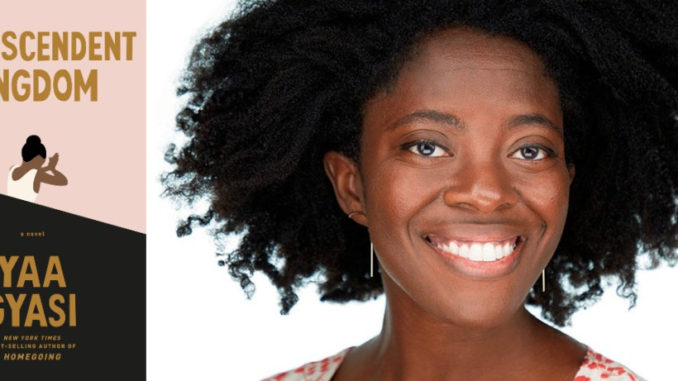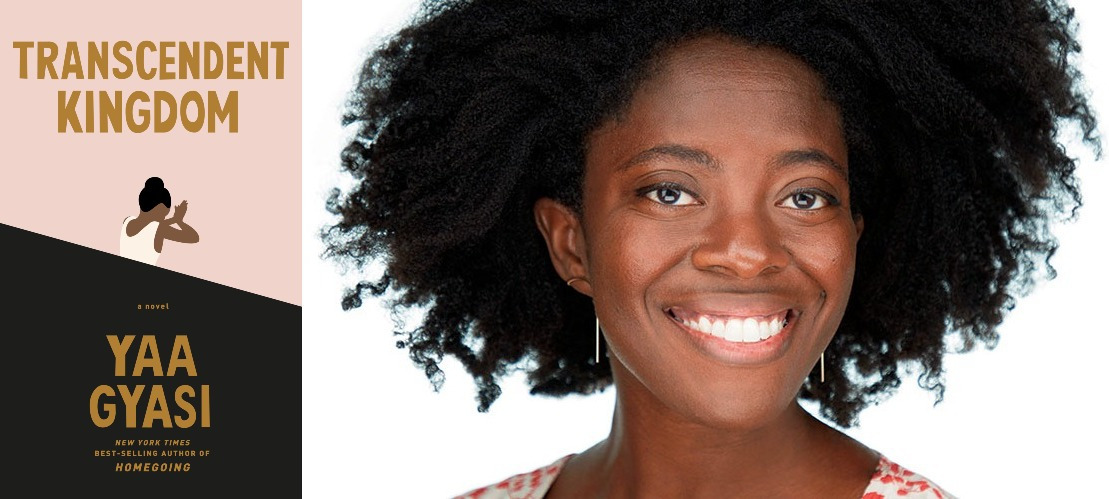
When Yaa Gyasi finished the first draft of “Homegoing,” her first novel, she decided she needed to “not think about that book for a while” and so she sat down to write a short story.
That story, “Inscape” (published in Guernica), focused on a character named Gifty, a Stanford English professor struggling to care for her mother, an exceedingly religious Ghanian immigrant. “I loved Gifty’s voice so much and the relationship that was unfolding between these two women who wanted to understand each other but who didn’t seem to have the capacity to give each other what they needed,” Gyasi recalls.
She wanted to explore it further but first had to return to “Homegoing,” which ultimately became an award-winning, best-selling debut that earned Gyasi a seven-figure book deal. “Homegoing” spanned hundreds of years following the descendants of two half-sisters from Ghana, one who married into wealth and one who was sold into slavery, with each chapter really being a distinct story about a different descendant.
Years later, Gyasi was visiting a friend who is a neuroscientist in her lab and became fascinated by her friend’s work studying mice to examine restraint and reward-seeking in the brain. As Gyasi decided to build her new novel around these ideas, she thought back to Gifty’s voice and struggles — and “Transcendent Kingdom,” which comes out September 1st, was born.
“Transcendent Kingdom” cuts between Gifty’s walled-in academic experience at Stanford, where she is completing her neuroscience Ph.D., and other stages of her life. Mostly, these other sections focus on her childhood in Alabama: Her mother copes with life in America, especially after Gifty’s father returns to Ghana while her brother, Nana, her closest ally until he becomes hooked on Oxycontin, forever alters the family dynamic. The pain and conflict cut deeply yet the book never feels too grim thanks to Gyasi’s acutely observed details and fully wrought characters.
This conversation has been edited for length and clarity.
Did you feel pressure or freedom after the success of your first book?
It was more pressure than freedom, but it was not external pressure. There’s something so freeing about a first novel where you don’t know if anyone will ever read it. You can be more playful and can shut out the idea of audience in a way you never can again, no matter how well or poorly that novel does. Just seeing it in a store or in somebody’s hands makes you really aware of the fact that the end product no longer belongs to you.
One really nice thing is that this book is so different from “Homegoing,” so I didn’t feel I was comparing myself to “Homegoing.”
Each book is hugely ambitious in scope and in the ideas you tackle yet they remain intimate in tone. Is that something you consciously strive for?
I like reading things and thinking about books that are maximalist in themes that cover a lot and feel like a life lived instead of tightly constructed and constricted narratives. I wanted this to feel like this woman’s life so we see everything she is dealing with. So that’s where the wide scope comes from, but because it’s grounded in this character, in her thoughts and feelings and relationships, the intimacy comes naturally.
How do you do all that — exploring the intersection of religion and science, the fragile bonds of mother and daughter, and issues surrounding racism and immigration, addiction, depression and shame — in under 300 pages?
I’m naturally concise as a writer. I’ve never been someone who writes hundreds and hundreds of pages and ends up cutting half in revisions. If anything, I always hear from editors that I need to make it longer and expand this or that part. There’s something really nice about a shorter novel, where you can feel the musculature of the book at work. A long novel has to really earn its keep or the reader gets pulled out a little, so I appreciate it when you can hold it all in a short novel.
But watch, the next thing I write will be 700 pages and I’ll be singing a different tune.
Did you set out which issues you wanted to touch on and then plot how to work them all in?
I’m not a big outliner or big planner, I just try to follow the flow of the story as it’s happening and all of that springs out of character. With Gifty, I was thinking about the things she would deal with and there were so many things that drew lines to other things. I could talk about religion and if she’s going to a predominantly white church in the South then she’s encountering racism so that gets pulled in naturally. Gifty was such an interesting and contradictory character that I could explore things that felt they were at odds but that made sense in the context of her life and experiences.
“Homegoing” had a more unusual structure, but this one is more structurally complex because of how much it moves back and forth in Gifty’s life. Did that come easily or did you have to rearrange the story as you were going?
I had trouble thinking about structure because the only other thing of sustained length I’d written was “Homegoing,” which had such a tight structure. And with this, anything was possible and it was really loose. It took me a while to figure it out. For the most part, I stuck with the way it flowed out but the draft before this was even more non-linear and the final draft became about creating more momentum within each section.
Gifty, her mother and her brother all endure so much pain and make so many bad decisions. Do you connect emotionally to these characters while you’re writing about all that they are going through?
I don’t really get emotional when I’m writing. I’m at a remove, hovering at a great distance. I don’t feel emotional about things happening to the characters until I’m reading it after a draft. I don’t ever feel I’m orchestrating things so I don’t feel bad for putting a character in a certain position. I don’t feel I have a choice about it — even though I obviously do — I feel this is what happens to them because this is what happens to them, not because I made it happen.
Gifty is always so deeply curious about everything else in the world but really struggles to look at herself and think about herself. Anytime someone asks her to examine herself or comes close to touching upon some kind of intimate place, she puts a wall up. I found that pleasurable to write even though she’s often behaving in atrocious ways.
The revision process feels different. I have to connect points better or make it read more clearly. That’s when I’m very aware of the fact that I’m holding the strings.





